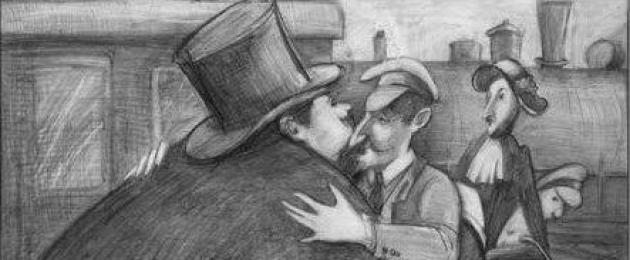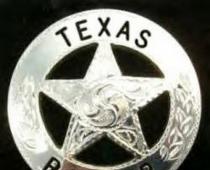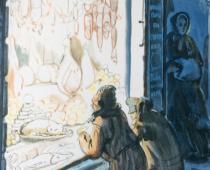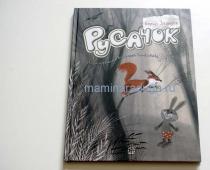The main characters of “Thick and Thin” are childhood friends, they once studied together, played pranks together, both retained many warm memories of that carefree period. The description of the appearance of the characters is the main antithesis in the work. The author does not immediately introduce the names of the characters into the story, at first he calls them “thick and thin”. This emphasizes not only the external, but also the internal characteristics of the characters, setting the reader up for the fact that they met people between whom misunderstanding is inevitable. In Chekhov's story "Thick and Thin" servility, the habit of kowtowing before higher ranks. The instant metamorphosis that happened to the “thin” and his entire family is so disgusting and irreversible that the “fat” tends to leave his old friend, he is “sick”.
Characteristics of the heroes “Thick and thin”
main characters
Fat (Misha) |
A full, good-natured person who loves to eat well. Behaves easily and naturally. He rose to the rank of Privy Councilor, has "two stars". He recalls school pranks with joy, sincerely glad to meet a childhood friend. Despite his position, he keeps himself simple, does not recognize servility among old friends. |
Thin (Porfiry) |
A thin man with a mountain of bags of suitcases and cardboard boxes in his hands. His family is his reflection. From the memoirs of Porfiry himself, we learn that in the gymnasium he was teased because he was sneaky. Talking about himself, he complains about low income, dissatisfied with his position. It seems that Porfiry is sincerely glad to meet his friend, but something keeps him in suspense. How to behave with Mikhail, his family cannot decide. They hide behind the head of the family. After Porfiry finds out that Misha has become a secret adviser, his face changes beyond recognition, and apart from nervous giggles and stutters, he can’t squeeze anything out of himself. |
Minor characters
In the work “Thick and Thin”, the characters meet by chance at the station, the “second” acquaintance occurs at the moment when Mikhail informs his friend about what post he occupies. At this moment, the image of Porfiry undergoes such grandiose changes that a new person. The transformation so strikingly reveals the character of the "subtle" and his family that further dialogue between friends is impossible. The situation positively characterizes the well-fed and well-to-do Mikhail, who turns out to be more humane and simpler than Porfiry, who wishes for life. The author urges to maintain one's own dignity, self-respect, and not to evaluate a person by his status in society.
useful links
See what else we have:
Artwork test
In 1883, a short story "Thick and thin" by A. Chekhov appeared in the "Shards" magazine. Short and concise in content, it is filled with deep meaning. The author addresses in it the problem of servility and servility, which has more than once become an object of criticism in Russian literature.
Composition and content (brief)
Fat and thin, former classmates at the gymnasium, met by chance at the station. The mention of the Nikolaev railway in the first sentence (this is a compressed exposition) suggests that the heroes of the story are officials. A. Chekhov does not give a detailed description of them, but the exact ones immediately clarify what is happening. For example, the mention that the fat one smelled of “sherry and fleur-d’orange” is a sign of wealth, while the thin one smelled of “ham and coffee grounds” helps to determine at what step of the social ladder each of the characters was. In addition, the latter was hung with boxes and suitcases - probably did not have extra funds or spared money for a porter.
The first to notice a former friend was fat. His joyful exclamation addressed to Porfiry becomes the plot of the action. They have not seen each other since childhood, and it is quite natural that a conversation is struck up between them. Short, but sufficient for the reader to get a complete picture of life position each of the friends.
The climax is the moment when the thin one finds out what heights his friend has reached in life. Misha immediately turns into "Your Excellency", and Porfiry himself unnecessarily becomes an obsequious and fawning little man, which further analysis will show.

Thick and thin during dialogue
Porfiry, seeing a childhood friend, was simply stunned. Former friends hugged and “kissed” three times - the author deliberately uses lofty vocabulary here to give the whole scene a mocking character.
Thin was extremely talkative and began boastfully talking about his life. He introduced his wife and son, while Nathanael first thought and only then took off his hat. He said that over the years of service in the office he had reached the rank of collegiate assessor. And he also makes and sells cigars - an additional profit to his salary. However, his joy and delight from the meeting disappeared at the same moment when he found out that his friend was “probably already a civilian?” - rose to the rank of Privy Councillor. Thin at first turned pale and as if petrified, after which he put on the widest smile on his face, probably best suited for a conversation with an important face. He immediately seemed to shrink, trying not to attract too much attention to himself. The same thing happened to his family and numerous bundles and cartons: they all suddenly shrank and wrinkled. Reverence, in any situation and in front of everyone who was at least a little more significant, became the norm for a petty official - this is the conclusion of Porfiry's behavior and his analysis.
Thick and thin parted completely different from how they met. The Privy Councilor, laconic and self-confident, but showing cordiality, was about to object to something, and then simply turned away, shaking his hand in parting. He was sick of such a change in his comrade.
And the whole family froze in a “pleasant stun”.

In childhood
The characters of the heroes and the memories of Porfiry will allow us to evaluate the analysis. Fat and Thin spent several years together at the gymnasium. Even then, the superiority of the first, nicknamed Herostratus, was obvious - in ancient times, a Greek with that name destroyed one of the wonders of the world with fire. Misha, on the other hand, burned the state book with a cigarette - he obviously wanted to win authority over his classmates.
The thin one was called Ephialtes, as he often taunted. And this name - a traitor to the Spartans at the Battle of Thermopylae - has been preserved in history. Years passed, and one remained handsome, "little soul" and dandy, lived sedately and in abundance. Another - "thanks" to the ability to please and many years of work, managed to rise to a low rank, which nevertheless gave a noble title. And now this difference between the former friends was exposed even more, and the constant fear of the authorities made Porfiry tremble in front of the one who a few minutes ago was only a “childhood friend”.
and part role
The main technique that Chekhov uses in the story "Thick and Thin" is the antithesis. The opposition of the characters is found in everything, including the title: from the mention of what everyone ate for lunch, to the manner of behavior and speech. Thin is indicative in this regard. If at the beginning of the meeting we hear from him: “you”, “my dear”, “childhood friend”, then later his tone changes to reverent and respectful. To the meaningful "your excellency", "such nobles, sir", "have mercy, sir", "hee-hee-hee", etc. pauses are added, as if it suddenly became difficult for him to speak.
In the second part of the story important role to reveal the image of a collegiate assessor, metaphor (“petrified”), comparison (“it seemed ... sparks rained from his face and eyes”), personification (boxes, knots “shrank, grimaced”). So in the story "Thick and Thin" Chekhov ridicules the hero's servility, cowardice, opportunism. Moreover, Thin does this unconsciously, out of habit, in words former comrade: "Well, that's enough ... And why this tone?".

The moral value of the work
The content of the story and its analysis cause sad thoughts in the reader. “Thick and thin” is an example of how self-deprecating a person can be in an effort to curry favor and please. And the great writer and connoisseur of the human soul, A.P. Chekhov, for a century and a half now, he has been urging us to look at ourselves and those around us so that society can finally get rid of the vices that hinder the establishment of healthy and sincere relations between people.
Characteristics of Tolstoy and Thin from the work of A.P. Chekhov "Thick and Thin".
The title, as always, is very accurate. Already from it we learn about the paramount actors. But immediately an interesting feature. The author does not give the heroes specific names: this characteristic(thick and thin) allows us to learn a lot more. The title contains the meaning of the work. We can immediately imagine that thick - important person, perhaps, occupying a high post, and thin is a petty official. Here we already see Chekhov's brevity. He himself wrote: "I know how to speak briefly about long things." Indeed, everything is short, but capacious. He achieves this with the help of a whole system of expressive means.
The action begins suddenly: "Two friends met at the station of the Nikolaev railway: one is fat, the other is thin." We immediately know who, where and what. We see that old acquaintances met, and from their speech it can be understood that the heroes were in good relations. Slim stammers with excitement, they friendly greet a friend of a friend. You read" and you feel the favorable atmosphere of their meeting. To show the mood, the author uses exclamatory sentences. "The friends kissed each other three times and fixed their eyes full of tears on each other. Both were pleasantly stunned,” notes the author.
Chekhov does not describe his appearance, he pays attention to the main thing: "Fatty had just had lunch at the station, and his lips, covered with oil, were shiny like ripe cherries ... Thin one ... was laden with suitcases, bundles and cardboard boxes." Chekhov uses metaphors (for example, glossy lips), comparisons (for example, like ripe cherries), epithets and others artistic means, and most importantly, he uses them gracefully, with skill. Every word, every trifle reveals the image of the heroes of the work.
The action develops very quickly. As a result of a change in the situation, an unexpected denouement comes. It turns out that the fat one "has already reached the secret level." It is worth knowing this to the subtle, and the friendly atmosphere suddenly disappears somewhere. He stammers even more often now, but no longer with joy. Chekhov writes: “The thin one suddenly turned pale, petrified, but soon his face twisted in all directions with the widest smile; it seemed that sparks fell from his face. He himself shrank, hunched over, narrowed ...” "Your Excellency". Thin suddenly began to add "-s" frequently, and the former exclamations diminished.
Tolstoy, moreover, did not like "this veneration of rank." He throws: “Well, that’s enough! What is that very tone for?” And the thin one can’t do it any other way. Chekhov continues: "So much reverence, sweetness and respectful acidity was written on his face that the Privy Councilor threw up."
The picture is ridiculous to the point of absurdity. When the "friends" said goodbye, the thin one shook three fingers, bowed with his whole body. She is funny, but also sad. Thus, Chekhov was able to fit a large socio-philosophical and psychological content into the form of a story. Even the fact that the heroes of the story do not have names speaks of the typicality of such people. The story of A.P. Chekhov "Thick and thin" is also relevant in this moment, after all, veneration, admiration for the position (behind which sometimes a person’s personality goes unnoticed) are often found in our days.
Anton Pavlovich Chekhov is a master of humorous storytelling. Through details, various symbols and images, he creates masterpieces that will be relevant for many generations to come. They always have something to learn, something to pay attention to. Until now, intelligent people draw wisdom from these stories.
A.P. Chekhov in his story "Thick and thin" very elegantly ridicules the shortcomings of people. Taking two childhood friends as a basis, the author, using their example, denounces admiration for ranks and hypocrisy.
Once good friends who studied together, a few years later they accidentally meet at the station. Them life paths never crossed paths before. And friends, delighted with the meeting, are sincerely interested in each other's destinies. Reminisce school years, thin (Porfiry) introduces a friend to his family.
And it was true, from the whole look of the fat one it was clearly visible that he occupied a high position in society, did not live in poverty, was accustomed to worship. And a good income allows him to realize all his desires. There are no special worries and problems in the life of an official, otherwise he could hardly afford to drink in the middle of the working day. Perhaps that is why he is so affable and freely shows his liberality towards people. Plus, the fat one is not burdened with family worries. He did not miss the opportunity to brag about the promotion, - "I have already risen to the secret ... I have two stars." This, of course, could not leave his friend indifferent. After all, before that he had already managed to boast of his achievements, which turned out to be not so significant in comparison with a friend.
Having learned about the high position of Michael, the subtle one, knowing firsthand what need is, immediately tried to catch the benefit for himself. The author describes this hero as follows: "Laden with suitcases, bundles and cartons."
Chekhov strives to show the servile nature of a frail and nondescript person. The author seems to give him the features of a workhorse. Nevertheless, having a low position in society, the thin one knew how to adapt to the mighty of the world this. And therefore, as soon as he found out about the promotion of a friend, immediately the simplicity and sincerity in his speech were replaced by hypocrisy and sycophancy. There is no trace left of the former Porfiry. In his confused manner of communication, one can understand the tension and envy of a friend. But at the same time, perhaps behind this mask is hidden the hope of support. In order not to lose face, the thin one is in a hurry to emphasize the high origin of his wife and the merits of his student son. It immediately switches to a formal tone of communication. But such a drastic change confuses Mikhail and even offends him a little. He saw in Porfiry a good friend, not a subordinate. The humiliation of his comrade is disgusting to him, he retires.
The moral is that often the former friendship comes to an end. No matter how good comrades people may be, if social inequality arises between them, there is practically no place for sincerity and honesty. But true friendship should not be afraid of any obstacles. Unfortunately, this is true.
Some interesting essays
- Criticism about the novel The Captain's Daughter of Pushkin and reviews of contemporaries
The very publication of the novel in the Sovremennik magazine did not arouse interest from critics. Not a single magazine or newspaper published in St. Petersburg and Moscow commented on Pushkin's new work.
- The image and characteristics of Vera Almazova in the story Lilac bush Kuprin
One of the main characters of the work is Vera Almazova, presented by the writer in the image of the wife of the protagonist of the story of a poor officer Nikolai Almazov.
- The image and characteristics of Tanya in the novel Doctor Zhivago Pasternak essay
Tanya is one of the main characters in Doctor Zhivago. She is the daughter of Yuri Zhivago and Larisa Antipova. This girl is a homeless girl.
- Analysis of Bradbury's The Vacation
A work called "Vacations" was written by American writer Ray Douglas Bradbury. An analysis of this work is presented in this article.
As you know, all people on this planet are unique. Each has its own individual character, its own destiny. You may be surprised, but books are also unique. They, like people, have their own destiny and character.
The story "Thick and Thin" (1883) refers to the early period of A.P. Chekhov's work. The story is very small in volume, as it is written unusually succinctly and concentrated. A recognized master, Chekhov knew how to "talk briefly about long things." At the same time, the author's position in the story is deliberately not accentuated - the reader himself can draw conclusions based on what he has read.
The genre of the work is a story written in the best traditions of critical realism. The story clearly shows the features of Chekhov's individual writing style: fast development plot, conciseness, attention to expressive details, accuracy of language.
Problems of the story
In the story, Chekhov shows the dependence of people on the occupation social status and related stereotypes.
The author, with his inherent subtle humor, ridicules people who crawl before the position. The main object of ridicule is a small official who grovels when no one forces him to do so. Chekhov truthfully and mercilessly paints a picture of the world of the “thin”, the world of slave psychology. The tragedy lies in the loss of their "I" by such people, the loss of a sense of personality.
Features of the plot composition of the story
The work is distinguished by its extremely brief exposition expressed in one sentence. Even two conclusions can be drawn from it. Firstly, the writer uses the antithesis, saying that one friend is fat, the other is thin, already opposing them to each other. Secondly. Nikolaevskaya Railway connected Moscow and St. Petersburg; its main passengers were officials. It can be assumed that the story will be about them. outstretched serves as an unexpected meeting of two childhood friends - Michael and Porfiry.
Development of action includes the first sincere joy of recognition, and general memories of childhood, and questions about life. Climax The work is the moment when the “thin” learns that the “fat” has the rank of Privy Councilor. In the acute social denouement the behavior of the “thin” and his family changes dramatically. The “thin” begins to fawn over the “thick”: the appeal to “you” is replaced by “your excellency”, a high style (“gracious attention”) appears in Porfiry’s speech. The writer's special technique - unfinished sentences - as if allows you to hear how the breath of the "subtle" is interrupted from reverence. "Tolstoy" is annoyed by the situation, and he is in a hurry to part with the "thin" family.
Character system
A distinctive feature of the story is the sharpness of the psychological characteristics of the characters. The relationship between the main characters - "thick" and "thin" - is based on the opposition of the two heroes.
There is no description of the appearance of the characters in the narrative, however, with the help of expressive strokes, Chekhov created vivid images, showing the place of each character in life. The author emphasizes the social difference of childhood friends with the help of smells: from the “fat” who dined at the station restaurant, it smelled of “sherry and fleur-d'orange”, from the “thin” - “ham and coffee grounds”.
In the second part of the story, the internal conflict intensifies. The writer reveals it through contrasting the facial expressions of the characters - the "fat" one "grimaced", while the "thin one turned pale, petrified", "shrank, hunched over, narrowed". The “fat” one retains the former appeal to Porfiry to “you”, and the “thin” one has “you” - “What are you with ...”.
The introduction of the minor characters of the wife and the "thin" son helps the author to fully reveal the features of Porfiry's character.
Analysis of stylistic features
The story was written in art style using elements conversational style.
Revealing the character of the characters with the help of a contrasting image, Chekhov widely uses a variety of stylistic devices: antonyms, comparisons, metaphors, alliteration, syntactic antithesis, repeated repetition of the union "a".
Throughout the story, the speech of the characters changes: at the beginning of the story, the author puts colloquial vocabulary (“darling”, “fathers”) into the mouths of the characters, which is replaced in the second part with an official business address.
As a doctor, as a writer, as a person, Chekhov reveals in his work the spiritual diseases of society, calling for "drop by drop to squeeze a slave out of oneself."
- Analysis of the story by A.P. Chekhov "Ionych"
- In contact with 0
- Google+ 0
- OK 0
- Facebook 0








